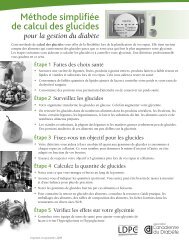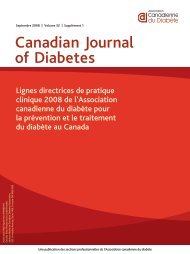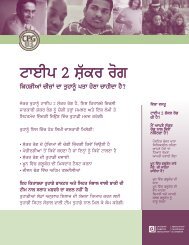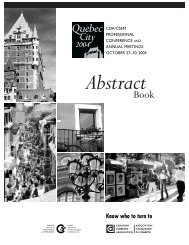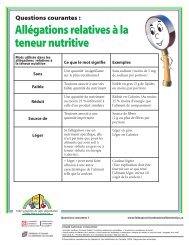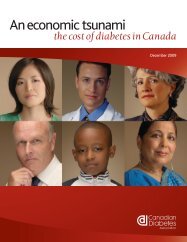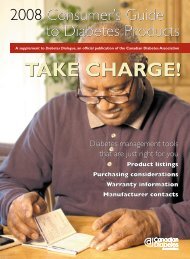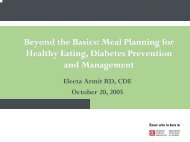2008 Clinical Practice Guidelines - Canadian Diabetes Association
2008 Clinical Practice Guidelines - Canadian Diabetes Association
2008 Clinical Practice Guidelines - Canadian Diabetes Association
Create successful ePaper yourself
Turn your PDF publications into a flip-book with our unique Google optimized e-Paper software.
high dietary fiber intake in patients with type 2 diabetes mellitus.<br />
N Engl J Med. 2000;342:1392-1398.<br />
37. Cooper PL, Wahlqvist ML, Simpson RW. Sucrose versus saccharin<br />
as an added sweetener in non-insulin-dependent diabetes:<br />
short- and medium-term metabolic effects. Diabet Med.<br />
1988;5:676-680.<br />
38. Chantelau EA, Gösseringer G, Sonnenberg GE, et al.<br />
Moderate intake of sucrose does not impair metabolic control<br />
in pump-treated diabetic out-patients. Diabetologia. 1985;28:<br />
204-207.<br />
39. Colagiuri S, Miller JJ, Edwards RA. Metabolic effects of<br />
adding sucrose and aspartame to the diet of subjects with noninsulin-dependent<br />
diabetes mellitus. Am J Clin Nutr. 1989;50:<br />
474-478.<br />
40. Coulston AM, Hollenbeck CB, Donner CC, et al. Metabolic<br />
effects of added dietary sucrose in individuals with noninsulindependent<br />
diabetes mellitus (NIDDM). Metabolism. 1985;34:<br />
962-966.<br />
41. Jellish WS, Emanuele MA, Abraira C. Graded sucrose/carbohydrate<br />
diets in overtly hypertriglyceridemic diabetic patients.<br />
Am J Med. 1984;77:1015-1022.<br />
42. Nutrition Subcommittee of the British Diabetic <strong>Association</strong>’s<br />
Professional Advisory Committee. Sucrose and fructose in the<br />
diabetic diet. Diabet Med. 1990;7:764-769.<br />
43. Hawkins M, Gabriely I, Wozniak R, et al. Fructose improves<br />
the ability of hyperglycemia per se to regulate glucose production<br />
in type 2 diabetes. <strong>Diabetes</strong>. 2002;51:606-614.<br />
44. Henry RR, Crapo PA,Thorburn AW. Current issues in fructose<br />
metabolism. Annu Rev Nutr. 1991;11:21-39.<br />
45. Wang YM, van Eys J. Nutritional significance of fructose and<br />
sugar alcohols. Annu Rev Nutr. 1981;1:437-475.<br />
46. Wolever TMS, Piekarz A, Hollands M, et al. Sugar alcohols and<br />
diabetes: a review. Can J <strong>Diabetes</strong>. 2002;26:356-362.<br />
47. Wolever T, Barbeau M-C, Charron S, et al. <strong>Guidelines</strong> for the<br />
nutritional management of diabetes mellitus in the new millennium:<br />
a position statement by the <strong>Canadian</strong> <strong>Diabetes</strong><br />
<strong>Association</strong>. Can J <strong>Diabetes</strong> Care. 1999;2:56-69.<br />
48. Franz MJ, Bantle JP, Beebe CA, et al. Evidence-based nutrition<br />
principles and recommendations for the treatment and prevention<br />
of diabetes and related complications. <strong>Diabetes</strong> Care.<br />
2002;25:148-198.<br />
49. Jackson AA. Limits of adaptation to high dietary protein<br />
intakes. Eur J Clin Nutr. 1999;53(suppl 1):S44-S52.<br />
50. National Cholesterol Education Program. Second Report of<br />
the Expert Panel on Detection, Evaluation, and Treatment of<br />
High Blood Cholesterol in Adults (Adult Treatment Panel II).<br />
Circulation. 1994;89:1333-1445.<br />
51. Expert Panel on Detection, Evaluation, and Treatment of High<br />
Blood Cholesterol in Adults. Executive Summary of The Third<br />
Report of The National Cholesterol Education Program<br />
(NCEP) Expert Panel on Detection, Evaluation, and Treatment<br />
of High Blood Cholesterol in Adults (Adult Treatment Panel<br />
III). JAMA. 2001;285:2486-2497.<br />
52. de Lorgeril M, Salen P, Martin JL, et al. Mediterranean diet,<br />
traditional risk factors, and the rate of cardiovascular complications<br />
after myocardial infarction: final report of the Lyon<br />
Diet Heart Study. Circulation. 1999;99:779-785.<br />
53. Hu FB, Cho E, Rexrode KM, et al. Fish and long-chain omega-<br />
3 fatty acid intake and risk of coronary heart disease and total<br />
mortality in diabetic women. Circulation. 2003;107:1852-1857.<br />
54. Grundy SM, Abate N, Chandalia M. Diet composition and the<br />
metabolic syndrome: what is the optimal fat intake? Am J Med.<br />
2002;113(suppl 9B):25S-29S.<br />
55. Howard BV. Dietary fat and diabetes: a consensus view. Am J<br />
Med. 2002;113(suppl 9B):38S-40S.<br />
56. Garg A. High-monounsaturated-fat diets for patients with diabetes<br />
mellitus: a meta-analysis. Am J Clin Nutr. 1998;67(suppl<br />
3):577S-582S.<br />
57. Ros E. Dietary cis-monounsaturated fatty acids and metabolic<br />
control in type 2 diabetes. Am J Clin Nutr. 2003;78(suppl 3):<br />
617S-625S.<br />
58. Heart Protection Study Collaborative Group. MRC/BHF<br />
Heart Protection Study of antioxidant vitamin supplementation<br />
in 20,536 high-risk individuals: a randomised placebocontrolled<br />
trial. Lancet. 2002;360:23-33.<br />
59. Rapola JM, Virtamo J, Ripatti S, et al. Randomised trial of<br />
alpha-tocopherol and beta-carotene supplements on incidence<br />
of major coronary events in men with previous myocardial<br />
infarction. Lancet. 1997;349:1715-1720.<br />
60. Yusuf S, Dagenais G, Pogue J, et al.Vitamin E supplementation<br />
and cardiovascular events in high-risk patients. The Heart<br />
Outcomes Prevention Evaluation Study Investigators. N Engl J<br />
Med. 2000;342:154-160.<br />
61. Omenn GS, Goodman GE,Thornquist MD, et al. Risk factors<br />
for lung cancer and for intervention effects in CARET, the<br />
Beta-Carotene and Retinol Efficacy Trial. J Natl Cancer Inst.<br />
1996;88:1550-1559.<br />
62. Ashley MJ, Ferrence R, Room R, et al. Moderate drinking and<br />
health. Implications of recent evidence. Can Fam Physician.1997;<br />
43:687-694.<br />
63. Bondy SJ, Rehm J, Ashley MJ, et al. Low-risk drinking guidelines:<br />
the scientific evidence. Can J Public Health. 1999;90:264-<br />
270.<br />
64. Burge MR, Zeise TM, Sobhy TA, et al. Low-dose ethanol predisposes<br />
elderly fasted patients with type 2 diabetes to sulfonylurea-induced<br />
low blood glucose. <strong>Diabetes</strong> Care. 1999;22:<br />
2037-2043.<br />
65. Richardson T, Weiss M, Thomas P, et al. Day after the night<br />
before: influence of evening alcohol on risk of hypoglycemia in<br />
patients with type 1 diabetes. <strong>Diabetes</strong> Care. 2005;28:1801-<br />
1802.<br />
66. Turner BC, Jenkins E, Kerr D, et al.The effect of evening alcohol<br />
consumption on next-morning glucose control in type 1<br />
diabetes. <strong>Diabetes</strong> Care. 2001;24:1888-1893.<br />
67. Kerr D, Macdonald IA, Heller SR, et al. Alcohol causes hypoglycaemic<br />
unawareness in healthy volunteers and patients with<br />
type 1 (insulin-dependent) diabetes. Diabetologia. 1990;33:<br />
216-221.<br />
S45<br />
MANAGEMENT



